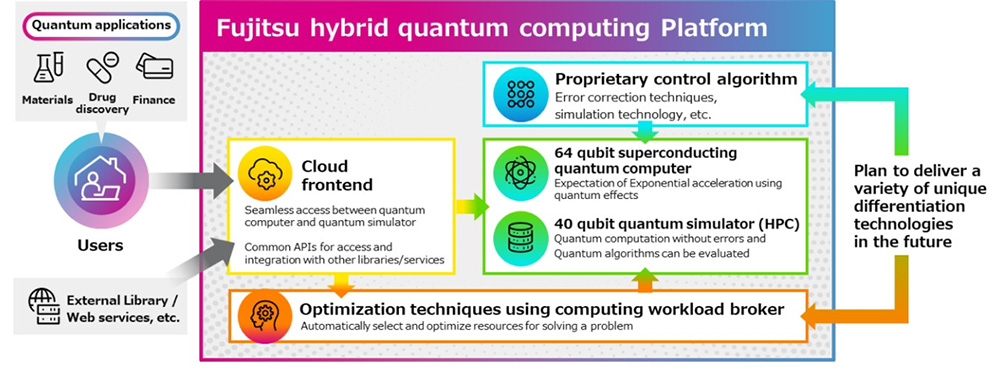The new era of quantum computing: from expectations to practical preparation
Fujitsu / November 7, 2023
As the amount of data becomes vast and complex, and computational capabilities approach their limits, quantum computers, which have the potential for a dramatic increase in speed, are attracting attention. As a result, significant economic value and positive environmental impact are also expected. Although current quantum computers have many errors and take time to become practical, efforts are actively being made to develop error mitigation and correction techniques, as well as new architectures. What are the benefits of the quantum computer era that Fujitsu is working on with its new quantum theory and practical innovations? We will provide deep insights and practical recommendations.
Contents
- Rising expectations for quantum computing
- The importance of continuous innovation to realize practical quantum computers
- The importance of acting without waiting for the realization of a quantum computer with perfect error resistance
- Accelerating innovation activities in quantum computing
- Capturing economic value and priority use cases
- Conclusion and recommendations
Rising expectations for quantum computing
In recent years, quantum computers, which have the potential to dramatically speed up computation time compared to conventional computers, have been attracting attention from governments and academia. In October 2019, Google's announcement of achieving "quantum supremacy" (*1) surprised the world and heightened expectations for a new era of quantum computing in the industry.
Behind this lies the fact that the miniaturization technology of semiconductors, which has evolved according to Moore's Law, is reaching its limit, and the current computational capabilities are becoming unable to meet new computational demands. Meanwhile, with the advent of the digital age, the amount of data being processed has grown tremendously. As a result, there is a growing demand for a leap in computing technology to solve complex challenges such as material properties, machine learning/AI model training, and optimization of social and economic systems. Indeed, quantum computing is attracting attention as a solution to this problem.
With the growing expectations for quantum computing, Major countries' governments have accelerated their development support policies, while an influx of private risk capital has occurred, making entrepreneurial activities more vibrant.
(*1) the demonstrable ability of a quantum computer to solve a problem that an ordinary computer could not solve in a realistic amount of time.
The importance of continuous innovation to realize practical quantum computers
Despite the growing expectations, there are challenges in realizing commercially viable quantum computing technology (both hardware and software).
Quantum computing is a new computing technology developed using the principles of quantum mechanics, which describe the properties of nature at the atomic and subatomic levels. Quantum computers use qubits instead of conventional computer bits, and these qubits have the unique ability to exist in multiple states at a specific time. Qubits are supported by two powerful physical features of quantum mechanics: superposition and quantum entanglement.
However, these two features, or the qubit states used in computing, are extremely delicate and fragile, making them susceptible to noise, heat, and other factors that can affect the time and accuracy of calculations. Therefore, to make quantum computers commercially viable, a considerable amount of innovation must be accumulated to overcome these challenges.
The importance of acting without waiting for the realization of a quantum computer with perfect error resistance
According to McKinsey, 72% of respondents believe that a fully fault-tolerant quantum computer (FTQC) (*2) will be realized by 2035, while 28% believe it will be realized by 2040. This means that it will take about another 10 years for quantum computers to meet the expectations of the industry and become commercially viable.
However, the industry is concerned that it may face disruption or competitive disadvantages against early adopters if missing out on the new era of quantum computing. This is because innovation activities in quantum computing are accelerating, and bridging technologies (*3) to FTQC are already being put into practical use.
(*2) Fully Fault-Tolerant Quantum Computer (FTQC): A computer that can perform accurate calculations with error rates kept within a threshold range due to error correction technology, fully realizing the advantages of quantum computing.
(*3) Refers to computational techniques realized by conventional IC chips (such as digital annealers) and computers (such as quantum simulators) inspired by quantum technology.
Accelerating innovation activities in quantum computing
In terms of development funding, the entry of public funds and risk capital is currently at a high level and is expected to continue expanding. For example, IDC's forecast (as of August 2023) predicts that investments in quantum computers (development, demonstration experiments, etc.) will reach $16.4 billion by 2027, with a CAGR of 11% from 2023 to 2027.
In the technical aspect, technology development (hardware, software, error correction, quantum algorithms, possible applications, etc.) by major companies such as IBM, Google, and Fujitsu, as well as prominent startups, is becoming more active, with various advancements being reported. For instance, Fujitsu has developed a new quantum computing architecture in collaboration with Osaka University to accelerate the practical application of quantum computers. This development enables the construction of a 64-qubit quantum computer with the equivalent performance of about 100,000 times that of current computers, provided there are 10,000 physical qubits. This is considered a significant technological advancement towards FTQC.
Furthermore, Fujitsu has successfully developed the world's fastest 40-qubit quantum simulator using the technology of its conventional supercomputer, "Fugaku." Fujitsu has developed a hybrid quantum cloud platform that combines the 64-qubit superconducting quantum computer, jointly developed with RIKEN, and this 40-qubit simulator (See the diagram). As a result, the development of quantum chemistry calculations, quantum financial algorithms, and quantum applications is expected to accelerate.

Source: Fujitsu
Overview of the new Fujitsu hybrid quantum computing platform
By combining these quantum computing technologies, Fujitsu is already advancing demonstration experiments with companies such as Fujifilm, Tokyo Electron, and Mizuho Financial Group.
Capturing economic value and priority use cases
McKinsey estimates that the economic impact brought about by quantum computers will reach approximately $1.3 trillion by 2035. Of course, it is necessary to consider that the economic impact will not occur at a specific point in time but will gradually expand as the number of adopters increases.
The economic impact will also vary by industry. Especially, it is expected that the finance, chemistry, life sciences, and automotive industries will receive significant benefits in terms of added value. These industries are likely to have relatively strong incentives for joint demonstration experiments with quantum computing vendors and early adoption.
There are four expected use case levels (application areas) where the value of quantum computing can be effectively utilized:
1) Optimization: Examples include portfolio optimization and network optimization.
2) Reinforcement of machine learning/AI: Examples include fraud detection and rapid AI training.
3) Simulation: Examples include pricing methods and material simulations.
4) Quantum cryptography: Examples include Shor's algorithm. However, it is necessary to consider the potential threats to various services caused by quantum algorithms breaking current classical cryptographic protocols.
Conclusion and recommendations
・ Due to the difficulty of developing quantum computing technology (hardware and software), it is necessary to continue utilizing the complementary relationship between quantum computers and conventional computers, depending on the use case, task content, etc. In other words, both conventional computers and quantum computers have their own strengths in terms of computing tasks. When considering technical and cost-performance aspects, etc., the two types of computers complement each other, and it is believed that they will coexist in the long term.
・Industries should pay attention not only to the progress of quantum computing technology development but also to the development of use cases and the adoption trends of companies. Acquiring knowledge and skills including talent development is also important. We recommend that industry start making realistic preparations now, including the necessary investments.
For detailed insights on quantum computing, please refer to Fujitsu's insight paper.
Quantum computer developed at the RIKEN RQC-Fujitsu Collaboration Center

1998 Fujitsu Research Institute, Senior Fellow
Dr. Jin's research mainly focuses on global economic, digital innovation/digital transformation, and Dr. Jin has published books such as “Free Trade and Environmental Protection”, etc. Recent writings: the following Fujitsu Insight Paper, etc.
・Transformative Quantum Computing : Striving for Greater Heights in Pursuit of Steady Progress(2023, Co-author)
・Transforming Supply Chains to Be More Productive, Resilient, and Sustainable (2023)
・Transformative Enterprise 5G: To Become an Attractive Enabler for DX (2023)
・The Composable Enterprise Emerging in the VUCA Era: From Concept to Practice(2023)
・Digital Transformation in Manufacturing: Top Challenges CxOs Face and Proven Solutions (2022)
Editor's Picks











